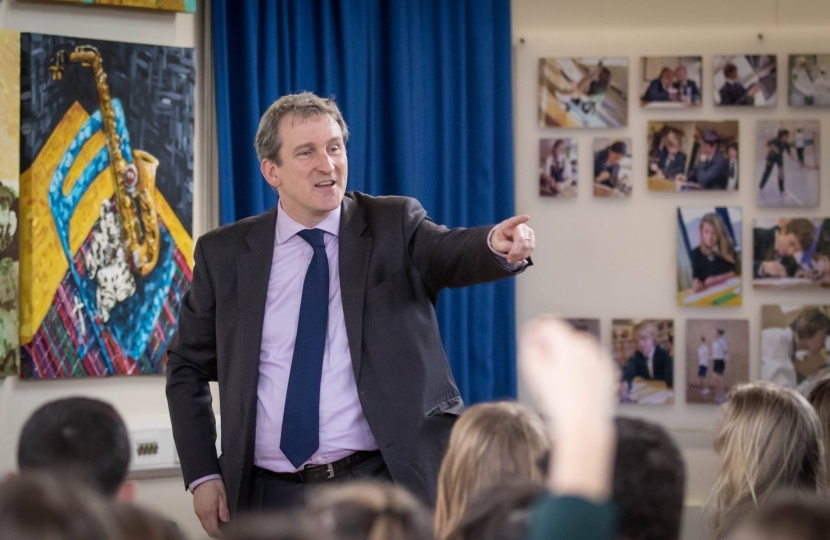
The Article below was written by Damian and published in this week's Herald editions and Petersfield Post:
"The full return of schools next week is much more than a waypoint on a road map. This is not just a cohort of children; these are our children, the future of our country.
A recent report for the Department for Education concludes that all year groups have experienced a learning loss in reading: between a month-and-a-half and two months on average; and typically more still in maths.
Of course, within those averages there is a big spread. The experience of education in lockdown has been uneven; we know that the attainment gap – which had narrowed 10% over the last decade – has widened again.
This effect on education won’t be made up in short order – it needs a sustained approach.
But it is only one of the aspects. For children, the pandemic forms a significant part of their conscious lives to date. Being away from friends, without the opportunities – and the structure and routine – of school, has much wider implications too.
If you think about the youngest children, so much of their development as a person – thinking of others, sharing, taking turns – comes from being around and with other children.
For older pupils and students, key transition moments have not been experienced as they should be; career starts have been blown off course.
We are all now very aware of the mental health effects of lockdown. There are physical health questions, too, as people have been without both organised sport and much of the natural activity that comes with daily travel.
We certainly can’t just cram our way through this. There are limits to how much you can lengthen days or terms – attention spans have limits, and holidays are important. But clearly there can be a role for additional time.
And there are plenty of things you can do beyond the normal school day which are also central to development and growing up. Hampshire’s Connect 4 Summer programme has shown some of the potential.
As we rebuild for children, our brilliant teachers and heads will obviously be in the lead. It is right that individual schools have the discretion and responsibility to decide how best to support pupils.
But we can’t put all the responsibility on the education system. This is a shared national endeavour in which everyone has a role.
As we start to come out of the pandemic, it will still be a difficult time for many. But this re-build project for children is so important. We need a national conversation that gets everyone talking about how everyone is involved.
Many schools in East Hampshire, as elsewhere, were already benefiting from volunteer reading assistants. I hope more people may be able to do that in future.
There are great existing schemes for mentoring, and programmes like STEM Ambassadors. They don’t need to be reinvented. But I hope more people will take a look at them.
There are a lot of people who actually have a teaching qualification but haven’t taught for a while. I’ve called for a simplified route back to the profession, for any that may be able to work part-time in the tutoring programme, or another role.
I know from the recent select committee session we did with East Hampshire sports clubs how committed they are to re-engaging with children – and to try to get new ones interested in their sport.
This week is National Careers Week, and there has never been a more important time for young people to see opportunities ahead of them, to be inspired by the experience of others and to understand how to realise their own ambitions.
I’d like every organisation and company in the country to have a board meeting item to discuss how they can support this great endeavour for our children. That might be giving a manageable amount of staff time for mentoring or careers advice.
It might be more direct: many employers locally have been looking at the Kickstart Scheme, as well as apprenticeships, and whether they can offer industrial placements for T Levels students. There’s a shared interest in developing young talent.
Or it might be about a much earlier stage. In the Hungry Little Minds campaign, initiated in my time at the Department for Education, companies from Arriva to Clarks and Penguin to Greggs showed ways they had found, in their normal business activity, to support early literacy development.
Our national task will be not just for pupils to catch up on school work. It’s to help children get back on track, to re-build opportunity, broaden horizons, and to get them back to enjoying their childhood.
…While also catching up on school work, and re-narrowing the attainment gap.
Obviously we play a key role at any time, as parents or as grandparents. Teachers take this to another level, sharing with families the responsibility for bringing on the next generation.
But the old words of wisdom are instructive: “it takes a village to raise a child”. Never has that been truer than now."


